National Assembly Standing Committee Meeting: Improving the efficiency of public investment management
The draft Law amending and supplementing a number of articles of the Law on Public Investment stipulates that a national important project is a project using public investment capital of VND35,000 billion or more - compared to the current level of VND10,000 billion.
Continuing the 27th session, on the morning of September 20, the National Assembly Standing Committee gave opinions on the draft Law amending and supplementing a number of articles of the Law on Public Investment.
Consider the scope of the revision
Presenting the Government's Report, Minister of Planning and Investment Nguyen Chi Dung said that after more than 3 years of implementing the Law on Public Investment, although many positive results have been achieved, some limitations and problems have appeared during the implementation process.
Some provisions in the Law are too rigid or incomplete, failing to meet practical requirements.
In addition, the Law on Public Investment has some points that are not consistent with other laws such as the State Budget Law, Construction Law, Land Law, Environmental Protection Law, Law on Organization of Local Government, Law on Planning... Therefore, amending the Law is necessary.
The Government has issued Document No. 127/TTr-CP dated April 12, 2018 reporting to the National Assembly Standing Committee on the draft Law amending and supplementing a number of articles of the Law on Public Investment.
After the National Assembly's review agencies commented on not yet considering the above-mentioned Report, the Prime Minister issued Document No. 552/TTg-KTTH dated April 24, 2018, requesting ministries, branches and localities to report on a comprehensive review of problems and difficulties in implementing regulations related to public investment.
The Ministry of Planning and Investment has compiled 597 opinions from 37 ministries, central agencies and 50 localities, including 329 opinions related to problems of the Law on Public Investment, researched and absorbed 276 opinions, and organized 3 workshops.
After receiving and editing, the scope and content of the amendments and supplements to the draft Law were expanded; 69/108 articles were impacted, amended and supplemented, 6 articles were abolished, 4 new articles were added, leading to a change in the structure of the (new) draft Law, with only 106 articles remaining.
Based on the opinions of the Appraisal Council, the Government agreed to submit to the National Assembly Standing Committee for consideration and report to the National Assembly for decision on the draft Law on Public Investment (amended), replacing the draft Law on amending and supplementing a number of articles of the Law on Public Investment as submitted.
Discussing at the meeting, members of the National Assembly Standing Committee agreed to amend the Law to innovate and improve the effectiveness of public investment management, but did not agree on the scope of the amendment.
Vice Chairman of the National Assembly Phung Quoc Hien said that the Government should consider changing the name and scope of the amendment of the draft Law because the comprehensive assessment of the amendment is not yet "mature" enough.
The Vice Chairman of the National Assembly pointed out that the recent difficulties were partly due to the inconsistency between the decree and the law, circulars, and poor coordination between the central and local governments...
The Vice Chairman of the National Assembly suggested that only the really problematic contents, which have been assessed for impact and are “mature”, should be revised, not the whole thing. After 5 years of implementing the Law on Public Investment, only when there is a full assessment will there be any revisions.
National Assembly Chairwoman Nguyen Thi Kim Ngan also agreed that any problems or difficulties in implementing public investment should be fixed. The report stated that there was confusion, which was correct, because of the transition from the old mechanism to the new mechanism, from the annual public investment plan to the medium term, but not because of the Law.
Besides, the points that the Government considers to be "rigid" and "incomplete" such as investment work, investment decisions, capital appraisal, ability to balance capital sources, multiple capital allocations, etc. are not due to the Law but due to the implementation stage.
“The Law on Public Investment has difficulties, but the shortcomings in the Law are only part of it, the larger part is due to the lack of strict implementation of the Law. I agree that it is necessary to review and amend what is lacking or not consistent, but what is not due to the Law but due to the management work, should not be amended,” the National Assembly Chairman emphasized.
Budgets must be closely managed and monitored.
Chairman of the National Assembly's Finance and Budget Committee Nguyen Duc Hai, representative of the agency reviewing the draft Law, said that the Draft Law has many provisions that the Government must provide detailed regulations. Review shows that out of 106 articles, nearly 30 articles provide for the Government to provide guidance.
Among them, many important contents are not within the authority of guidance such as: cases of adjustment that increase total investment; project appraisal; authority to decide on special projects; order of priority, selection of project portfolio.
This is not only inconsistent with authority, but also causes difficulties in the implementation process and does not ensure the requirements of codification.
Therefore, the Government needs to specify the articles and clauses in the draft Law in maximum detail, ensuring specificity, transparency and appropriateness in terms of authority. For issues under its guiding authority, the Government needs to urgently develop a draft Decree to be submitted with the draft Law.
The draft amended Law removes current regulations on the duties and powers of the National Assembly Standing Committee in adjusting medium-term and annual public investment plans, assigning this authority to the Government.
To ensure consistency with current legal provisions, including the State Budget Law, to ensure compliance with Resolution 26 of the National Assembly and to maintain stability as in practice, the Standing Committee of the Finance and Budget Committee proposes to maintain the current regulations on the authority of the National Assembly Standing Committee.
The draft Law needs to clearly stipulate the tasks and powers of the National Assembly Standing Committee, including: deciding to adjust the structure and level of public investment capital for programs and projects in cases where the total planned capital level has not changed as decided by the National Assembly; reviewing and deciding on the list of projects using public investment capital; adjusting the list of public investment projects; supervising the implementation of allocation and assignment of public investment capital plans of ministries, branches, and localities...
A notable point in the draft Law is the regulation that an important national project is a project using public investment capital of 35,000 billion VND or more (currently 10,000 billion VND).
The Finance and Budget Committee believes that the Government's Proposal only stated that this level is equivalent to 0.6% of GDP without providing a basis for adjustment or impact assessment, so it is not sufficient.
Chairman of the National Assembly's Finance and Budget Committee Nguyen Duc Hai analyzed: Adjusting the total investment level will only be applied in case of major fluctuations in the consumer price index.
Meanwhile, over the past 3 years, since the Law was applied, the consumer price index has not fluctuated much.
Current regulations on determining the capital level of national important projects from 10,000 billion VND or more have been calculated to ensure compliance with Vietnam's actual conditions, with the ability to balance the State budget capital source.
In addition, the number of projects with a total investment of over VND 10,000 billion in public investment capital in recent times is very small, and the implementation of this regulation has not caused any problems regarding the project capital ceiling.
Head of the National Assembly Standing Committee's Petition Committee Nguyen Thanh Hai said that in principle, spending people's money requires permission from elected bodies.
It is unreasonable to base the criteria for projects to be submitted to the National Assembly and the National Assembly Standing Committee on GDP. The important thing is to base it on the capacity of the appraisal agency and the permitting agency.
As the number of full-time National Assembly deputies increases, with sufficient capacity and time, the required capital to be presented should decrease.
“Increasing the regulation on increasing project capital will reduce the number of projects submitted to the National Assembly and increase the number of projects decided by the Government, which is not suitable for reality. This limit must be gradually reduced as the number of full-time representatives increases. The project may be small, but if the National Assembly has the capacity and time to appraise it, it still needs permission,” emphasized delegate Nguyen Thanh Hai.
Vice Chairman of the National Assembly Phung Quoc Hien emphasized that expenditures must have estimates, be decided by competent authorities and "the budget must be closely managed and monitored. People's money cannot be neglected"./.

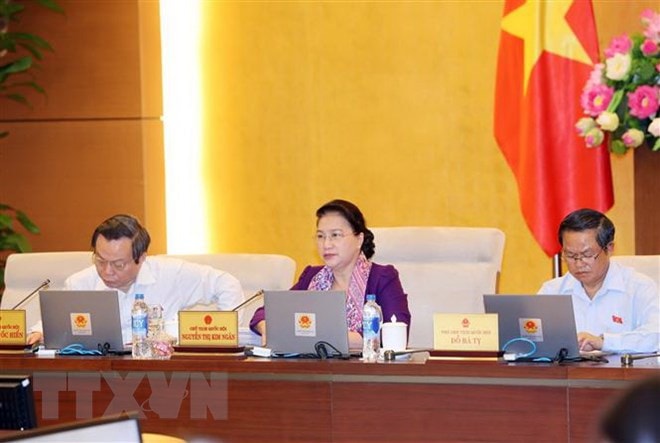

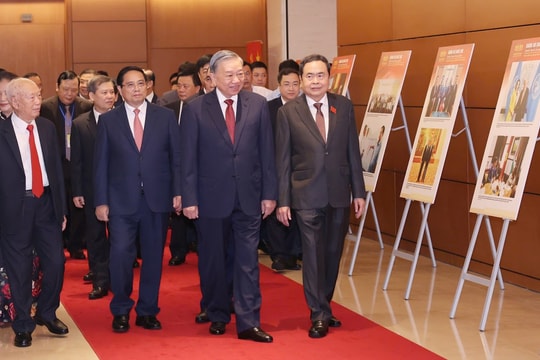
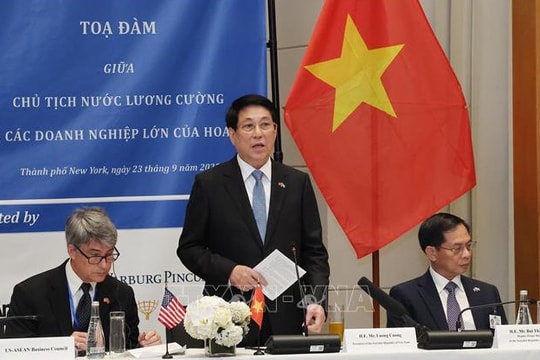
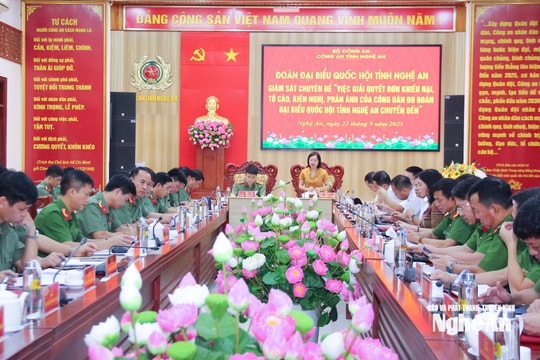
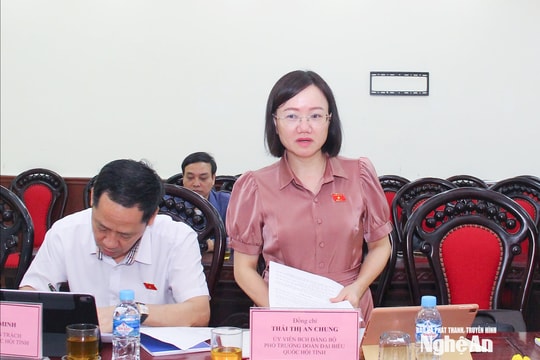

.jpg)
